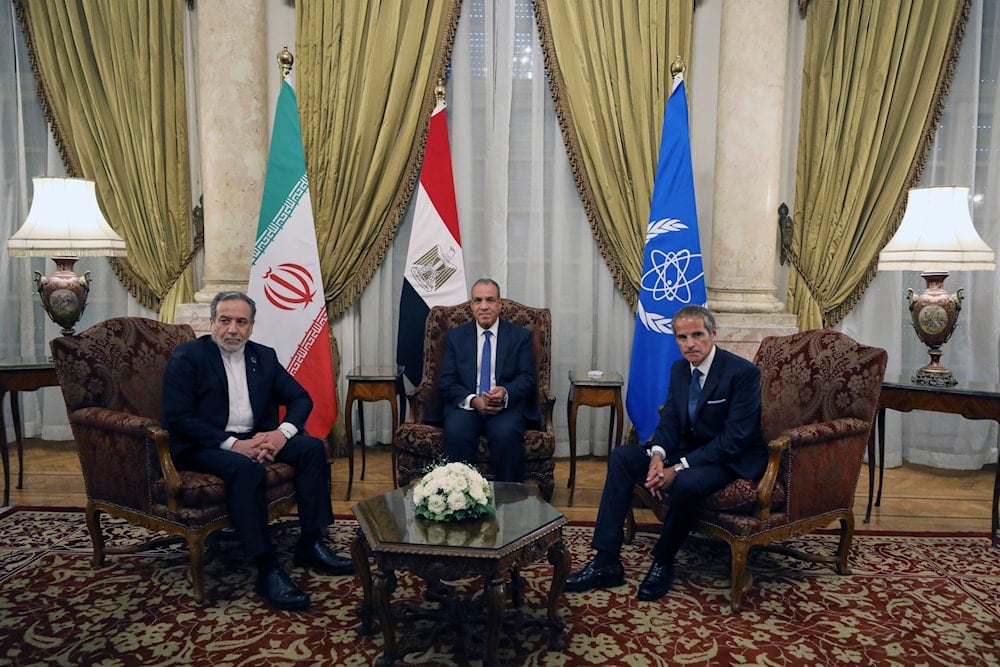Iran SNSC warns IAEA coop. hinges on no hostility security guarantees
Iran's Supreme National Security Council says nuclear cooperation with the IAEA will follow internal security approvals and may be suspended if hostile actions continue.
-

Egyptian Foreign Minister Badr Abdelatty meets with his Iranian counterpart Abbas Araghchi and the Director General of the IAEA, Rafael Grossi, at Tahrir Palace in Cairo, Egypt, Tuesday, Sept. 9, 2025 (AP)
The Secretariat of Iran’s Supreme National Security Council (SNSC) issued a statement Sunday confirming that the recently signed Cairo Agreement with the IAEA completely aligns with the decisions approved by its nuclear committee, which had reviewed all the details of the arrangements.
It further stated that the nuclear committee, a body composed of senior officials from relevant institutions that the SNSC has historically authorized to make binding decisions, acted in accordance with its standard procedures on this occasion as well.
Regarding the Iranian nuclear facilities under IAEA supervision that have been attacked by the US and the Israeli occupation, it stated that Iran will first ensure the necessary security and safety conditions and then, only after obtaining the SNSC’s approval, submit its report to the IAEA.
"Secondly, in the next stage, the implementation methods of cooperation between Iran and the Agency regarding the report submitted to the Agency must be agreed upon between the parties, including the approval of the Supreme National Security Council, in accordance with the internal procedure for the implementation of any action," the SNSC added in its statement.
The statement concluded by emphasizing that "should any hostile measures be taken against the Islamic Republic of Iran or its nuclear facilities — including the revival of previously closed UN Security Council resolutions — the implementation of these arrangements will be immediately suspended."
The statement both reaffirmed Iran’s stance that all nuclear cooperation with the IAEA must comply with its domestic security and legal oversight, particularly after attacks on its nuclear infrastructure, and underscored its warning that any external aggression or attempts to leverage the UN Security Council against it will nullify existing agreements.
Iran, IAEA sign new cooperation agreement in Cairo
Iranian Foreign Minister Abbas Araghchi and International Atomic Energy Agency (IAEA) Director General Rafael Grossi signed a new agreement to restart nuclear cooperation on September 9 during a trilateral meeting in Cairo with the participation of Egyptian Foreign Minister Badr Abdelatty.
Speaking at a joint press conference, Grossi stated that both sides had agreed on practical mechanisms to resume inspection activities inside Iran and later noted on the social media platform X that this agreement represented an important step in the right direction while also expressing gratitude to Egyptian Foreign Minister Badr Abdelatty for his commitment and participation.
Iranian Foreign Ministry spokesperson Esmaiel Baghaei revealed that Tehran and the agency had reached a new understanding which defines the framework for their cooperation and communication under the current conditions, particularly in the aftermath of the recent attack on Iranian nuclear facilities.
Iranian Foreign Minister Abbas Araghchi stressed that the agreement would not permit the inspection of facilities that were attacked and further emphasized that IAEA inspectors would be unable to access any nuclear site without explicit authorization from Iran's Supreme National Security Council.

 3 Min Read
3 Min Read










